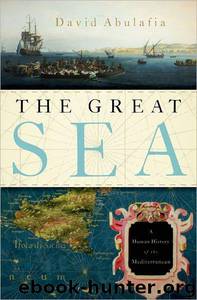The Great Sea: A Human History of the Mediterranean by David Abulafia

Author:David Abulafia
Language: eng
Format: mobi, epub, azw3
Tags: History
ISBN: 0195323343
Publisher: Penguin
Published: 2011-05-05T00:00:00+00:00
IV
The Black Death has sometimes been seen as a natural check on the excessively rapid expansion of the economy of Europe and the Mediterranean lands in the high Middle Ages: population grew so fast that intolerable pressure was placed on the land, forcing up grain prices, and forcing out the production of up-market foodstuffs such as eggs and chickens. Marginal lands that produced poor yields were brought into cultivation; every stalk of grain counted. Famines occurred more and more often, especially in highly urbanized areas such as Tuscany, though the shortages were far worse in northern Europe, especially the Great Famine of 1315 onwards, which had little effect south of the Alps.31 Yet a more optimistic picture can also be painted. By 1340, population had peaked, at least in western Europe and Byzantium. Between 1329 and 1343 the urban population of Majorca shrank by 23 per cent, and similar figures can be produced for towns in Provence and elsewhere.32 Greater specialization stimulated trade networks, bringing vital necessities to the cities in return for commercial products. As early as 1280, the Pisans abandoned indifferent grain lands in the mouth of the Arno to sheep; they traded leather, meat, cheese and wool for grain from overseas, for there is hardly a part of a sheep that cannot be put to good use. The little Tuscan town of San Gimignano, specializing in commercial crops such as saffron and wine, was able to support a population denser than at any time before the twentieth century. Its commercial network extended into the Mediterranean, where, as has been seen, its merchants traded local saffron as far east as Aleppo. This trend to ‘commercialization’, visible also in northern Europe, anticipated many of the developments that followed the Black Death.
Whether or not the economy was emerging from a crisis around 1340, the Black Death knocked Europe and the Islamic world off balance. The death of up to half of the population of the lands around the Mediterranean was bound to have dramatic effects on the social, economic, religious and political life of the peoples of the Mediterranean. It was a psychological shock as much as an economic one.33 Yet the plague did not induce a long Dark Age comparable to the bleak periods that marked the end of the Bronze Age and the collapse of Roman unity in the Mediterranean. The coming of the plague had accentuated the troubles of the late Roman Empire and had delayed recovery, but it was not the sole cause of the massive recession that occurred. But the plague of the fourteenth century was the main agent in transformations within the Mediterranean and the lands beyond that led to the creation of a new order.
The Genoese were unwittingly responsible for the arrival of the Black Death in the Mediterranean. Bubonic plague was brought to their trading base at Caffa in the Crimea not by merchants but by Mongol armies, who besieged Caffa in 1347.34 Several Italian ships managed to flee from the war
Download
The Great Sea: A Human History of the Mediterranean by David Abulafia.epub
The Great Sea: A Human History of the Mediterranean by David Abulafia.azw3
This site does not store any files on its server. We only index and link to content provided by other sites. Please contact the content providers to delete copyright contents if any and email us, we'll remove relevant links or contents immediately.
The Lonely City by Olivia Laing(4801)
Animal Frequency by Melissa Alvarez(4471)
All Creatures Great and Small by James Herriot(4322)
Walking by Henry David Thoreau(3962)
Exit West by Mohsin Hamid(3826)
Origin Story: A Big History of Everything by David Christian(3692)
COSMOS by Carl Sagan(3623)
How to Read Water: Clues and Patterns from Puddles to the Sea (Natural Navigation) by Tristan Gooley(3469)
Hedgerow by John Wright(3361)
How to Read Nature by Tristan Gooley(3341)
The Inner Life of Animals by Peter Wohlleben(3318)
How to Do Nothing by Jenny Odell(3302)
Project Animal Farm: An Accidental Journey into the Secret World of Farming and the Truth About Our Food by Sonia Faruqi(3221)
Origin Story by David Christian(3201)
Water by Ian Miller(3185)
A Forest Journey by John Perlin(3075)
The Plant Messiah by Carlos Magdalena(2934)
A Wilder Time by William E. Glassley(2863)
Forests: A Very Short Introduction by Jaboury Ghazoul(2842)
